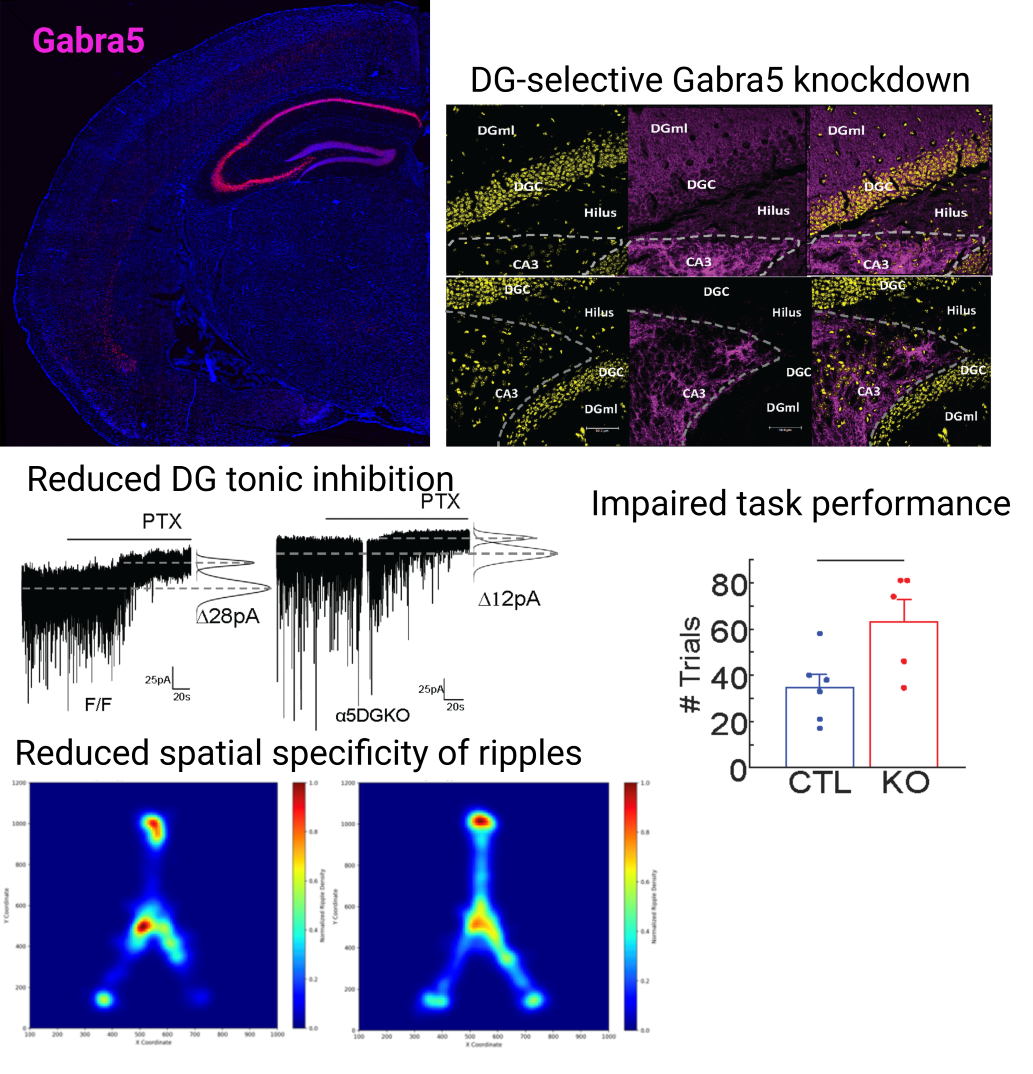Abstract
Gamma-aminobutyric acid (GABA), the brain’s primary inhibitory neurotransmitter, plays a key role in learning and memory through its action on ionotropic GABAAA receptors, which are expressed in diverse neuronal populations and circuits within the hippocampus. Among these, α5 subunit-containing GABAA receptors (α5GABAARs) have attracted particular interest due to their preferential expression in the hippocampus and distinct kinetic properties. Early studies suggested that systemically administered α5GABAAR-selective antagonists might function as general procognitive agents with minimal side effects. Although pharmacological and genetic studies in mice have indicated that α5GABAARs may act as a general inhibitory constraint on memory, the specific roles of these receptors in distinct hippocampal subregions, in discrete memory processes, and in regulating hippocampal network activity remain incompletely understood.
To address these questions, we generated mice with targeted knockdown of α5GABAARs in the CA1, CA3, or dentate gyrus (DG) subregions of the hippocampus and examined the contributions of α5GABAARs in each region to various memory processes. In mice with DG-specific knockdown of α5GABAARs (α5DGKO), we found that α5GABAAR-mediated inhibition of DG granule cells supports performance in complex memory tasks that require discrimination between highly similar stimuli, while having minimal impact on simpler memory tasks. This function could not be compensated by α5GABAARs in the adjacent CA3 region or by a different GABAAR subtype (α2GABAARs) in the DG.
Consistent with a selective role in complex memory processing, DG-specific knockdown of α5GABAARs enhanced hippocampal oscillatory activity known to correlate with improved memory performance. However, this increase in activity was accompanied by reduced temporal specificity of oscillatory signals, which became more uniformly distributed across task acquisition periods rather than being concentrated at time points critical for accurate memory encoding.
Together, these findings provide new insight into the region- and task-specific functions of α5GABAARs in regulating hippocampal activity and memory. They also underscore the need for a more nuanced translational approach to the development of α5GABAAR-targeting compounds as cognitive enhancers

C–E, Immunofluorescence staining of coronal sections from an F/F mouse showing DAPI counterstain (C), α5 antibody (D), and merged image (E). C′–E′, Same as C–E for α5DGKO.
Biography
Dr. Elif Engin is a clinician-scientist whose work bridges neuroscience research with clinical practice as a therapist. She completed her PhD in Behavioral Neuroscience at the University of Alberta in Canada, followed by postdoctoral training in the laboratory of Dr. Uwe Rudolph at Harvard Medical School, where she focused on the genetic neuropharmacology of GABAA receptors. Since 2017, Dr. Engin has served as an Assistant Professor of Psychiatry at Harvard Medical School and a principal investigator at McLean Hospital. Her laboratory investigates how early developmental experiences, particularly early life stress, influence the maturation of the brain’s GABAergic system, with a specific focus on the hippocampus. By exploring the molecular and cellular mechanisms underlying vulnerability to psychiatric disorders, Dr. Engin’s work aims to identify novel targets for therapeutic intervention. In addition to her research, Dr. Engin holds a degree in Clinical Mental Health Counseling and is a practicing clinician at the OCD Institute at McLean Hospital. She is the recipient of several awards, including the Alfred Pope Young Investigator Award and the Brain and Behavior Research Foundation Young Investigator Award.
